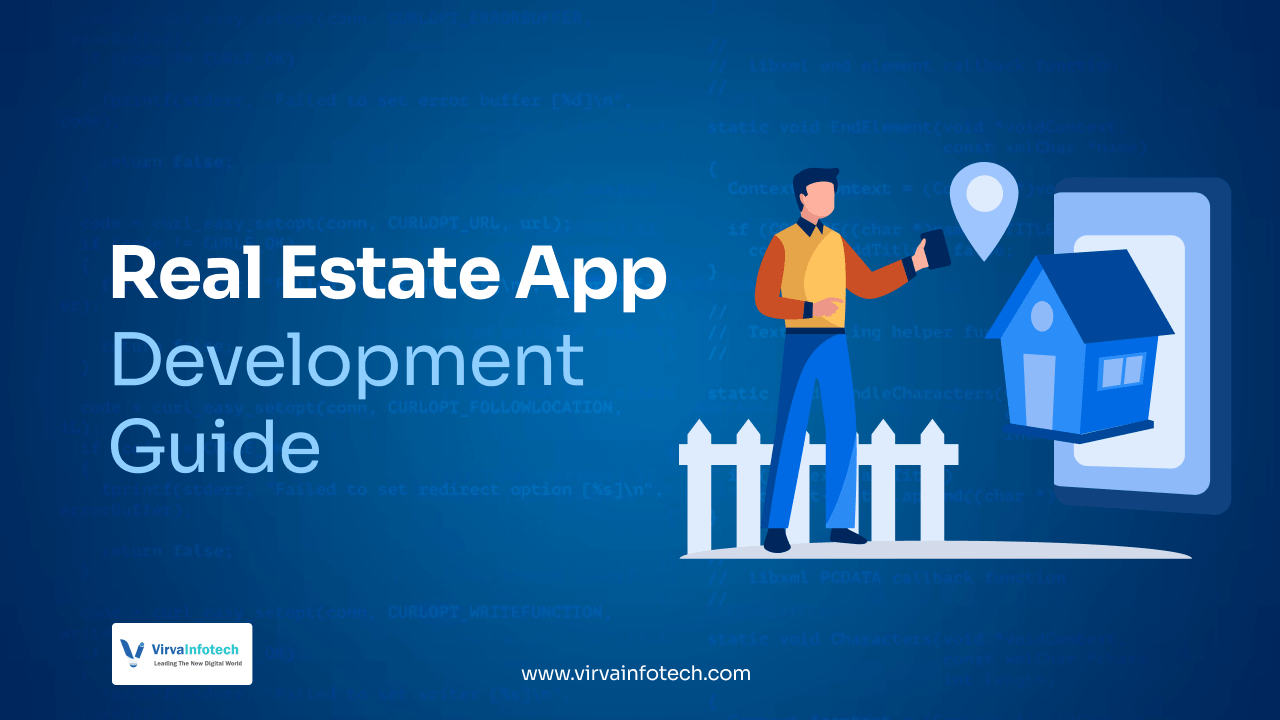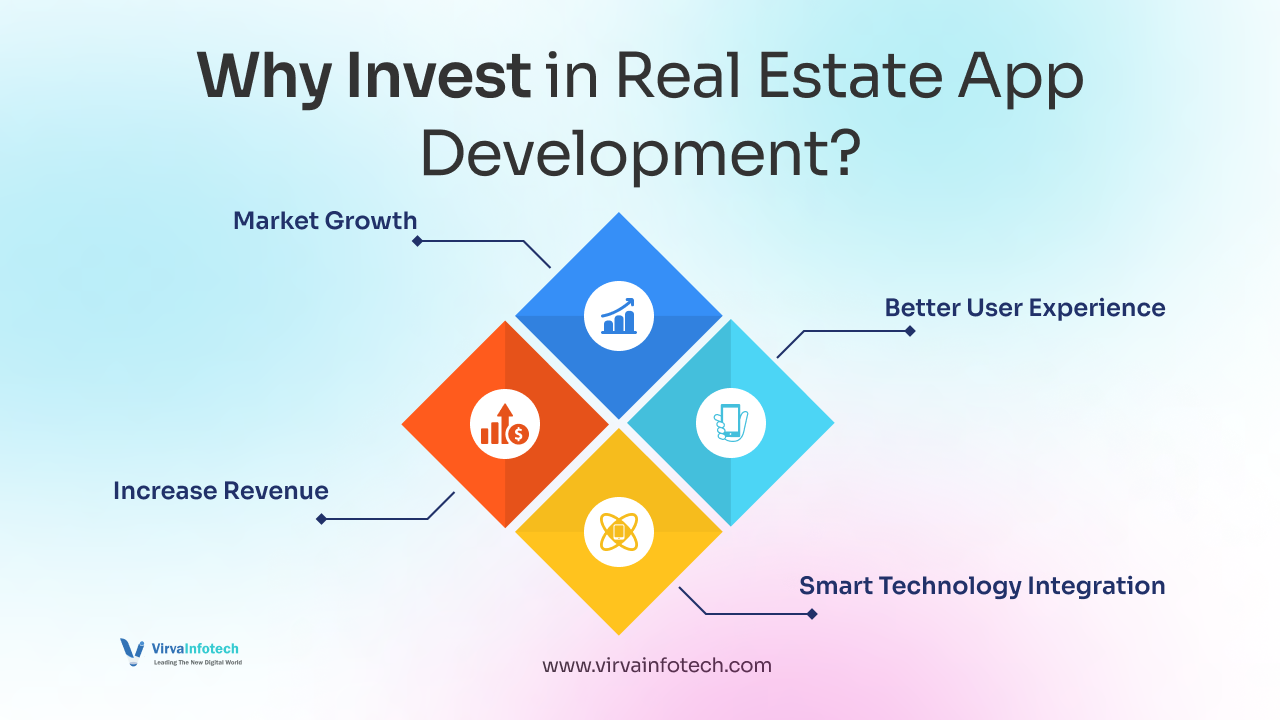Posted At: Mar 06, 2025 - 96 Views

Introduction:
The real estate industry is rapidly shifting towards digital solutions. Today, buyers, sellers, and agents prefer real estate apps over traditional methods to search, list, and manage properties. With the rise of PropTech (Property Technology), investing in a real estate mobile app is a smart move for businesses.
Types of Real Estate Apps

1. Property Listing & Buying Apps
These apps allow buyers to search for properties by area, budget, size, or amenities. They also allow listings to be viewed in detail, provide virtual tours of properties, offer mortgage calculators, and allow direct messaging to sellers or their agents.
✅ Key Features:
✔ Advanced Property Search – Buyers can filter by location, price, property type, and features.
✔ Virtual Tours & High-Quality Images – Helps users explore homes without visiting them in person.
✔ Mortgage Calculator – Estimates loan payments, interest rates, and down payments.
✔ Direct Messaging & Contact Seller Options – Connects buyers with property owners or agents.
2. Rental & Lease Apps
These applications assist the tenants in searching for properties available for rent or to have the necessary services to help landlords advertise and manage the rental property. They would find short-term and long-term rentals, verify the landlords, and ensure the payments are made securely.
✅ Key Features:
✔ Instant Rental Search – This will provide users with the option to search apartments, houses, or holiday homes.
✔Tenant Verification and Background Checks- Extensive checks for tenant verification, making it safe for landlords and tenants to cross paths.
✔ Payment of rent online with lease agreements- Tenants can pay rent using the application securely.
✔Reservation System for Short-Term Stays – This is dedicated to vacation rentals and bookings in an Airbnb manner.
3. Real Estate Agent Apps
These apps are designed to help real estate agents manage client interactions, property listings, sales leads, and marketing efforts.
✅ Key Features:
✔ Client & Lead Management (CRM) – Keeps track of potential buyers & sellers.
✔ Property Listings & Updates – Agents can add, modify, or remove property details.
✔ Appointment Scheduling – Allows agents to book meetings & property visits.
✔ Document Management – Handles contracts, agreements, and sales records digitally.
4. Property Management Apps
These apps help landlords and property managers with various tasks, including assisting tenants, collecting rent, and maintaining maintenance requests and lease tracking.
✅ Key Features:
✔ Automated Rent Collection & Payment Reminders—helps landlords track payments & late fees.
✔ Tenant Communication & Maintenance Requests—help tenants reporting issues & requesting repair.
✔ Lease Agreement Tracking—stores digital contracts and lease renewal notifications.
✔ Financial Reporting & Expense Management—keeps track of income, taxes, and property expenses.
5. Real Estate Investment Apps
These apps help investors buy, sell, and manage real estate investments, providing tools for market analysis, property valuation, and portfolio tracking.
✅ Key Features:
✔Real Estate Crowdfunding – Investors can buy shares in rental properties & commercial spaces.
✔Market Analysis & ROI Calculations – Property value & investment risk insights are provided.
✔Portfolio Management Dashboards – Tracks assets, income, and return on rentals.
✔Automated Alerts & Market Trends for Properties – Alerts users about hot deals & market shifts.
Why Invest in Real Estate App Development?

✅ Market Growth
The real estate mobile applications market is developing at a rapid rate, with individuals increasingly opting for online property searches as opposed to traditional methods.
✔ Global Growth: The real estate app industry is anticipated to register a staggering growth rate by 2025, mainly on the back of the digital transformation.
✔ Change in User Behavior:90% of buyers look for properties online-to this effect, mobile applications have become indispensable for real estate businesses.
✔ Convenience and Accessibility: Real estate apps allow buyers an instant search, virtual tours, and a buyer's easy communication with sellers and agents.
✅ Increased Revenue
A real estate mobile app can generate multiple revenue streams, making it a profitable investment.
✔ Advertisement and Sponsored Listings: Agents, brokers, and property owners can pay for premium listings and advertisement places.
✔ Commission Based Model: Apps would be charging commissions in percentage from the transactions, bookings, or agent referrals they make.
✔ Subscription Plans: Many real estate applications offer a paid subscription-based model, either monthly or yearly, that allows subscribers to access exclusive services like lead generation and CRM tools.
✔ Online Transactions & Marketplace:Rental payments can be made via the app, property purchases, and investments done directly through the app amounting to very high revenues.
✅ Better User Experience
A real estate app improves customer engagement and satisfaction by offering an interactive and seamless experience.
✔ 3D Virtual Property Tours: It's possible to explore homes, apartments, or commercial properties virtually in 360-degree panoramic view.
✔ AI Property Recommendations: Advanced AI algorithms in this application recommends properties based on the users' preferences, budget, and location.
✔ Instant Messages & Support: Chat or talk through in-house video calls put buyers, sellers, and agents in instant real-time communication.
✔ Push Notifications & Alerts: Users also collect such news in real-time about price drops, new listings, and availability of the property.
✅ Smart Technology Integration
Real estate apps use fresh technologies to provide a better user experience, build trust, and streamline operations.
✔ Artificial Intelligence (AI): AI-based chatbots & property search filters help users find the best real estate options faster.
✔ Big Data & Predictive Analytics: Provides insights into the market, property price trends, and investment opportunities.
✔ Blockchain for Secure Transactions: This guarantees safety, transparency, and tamper-proof real estate deals using smart contracts.
✔ Augmented Reality (AR) and Virtual Reality (VR): Offers interactive 3D tours to maximize property viewing experiences.
Step-by-Step Real Estate App Development
Step 1: Market Research & Planning
Before starting development, you need a clear understanding of the real estate market, competitors, and user needs.
✔ Define the Audience: Let's decide on the sort of people we want to attract to our app, e.g. property buyers, property sellers, property renters, real estate agents, landlords or property investors.
✔ Analyze Competitors: We can also have a look at some other popular names- Zillow, Redfin, Realtor.com, and Trulia to know what features are included in their applications, what business model they work with, and how do they strive for users' attention.
✔ Define Unique Selling Proposition (USP): Create strong point(s) about why a customer should go for our product and not with our competitor(s) that we offered for example, giving artificial intelligence on property recommendation, blockchain in dealing, VR tour for a property, AR tour, etc.
Step 2: Choose the Right Business Model
A real estate application can monetize through various media, and that is dependent on the business goal; hence, it is advisable to choose the most appropriate monetization strategy.
✔ Charge a Commission: Earn commission on every property transaction (buy, sell, or rent) that has been made through the app.
✔ Freemium Model: Offer basic property search features free to users and charge for premium features like AI recommendations or 3D virtual tours.
✔ Subscription Model: Have real estate agents or property managers pay a monthly or annual fee for listing properties and accessing useful tools.
✔ Advertisement Based Model: Income can be earned from this, in which advertisements for builders, mortgage providers, and home decor brands within the application can be displayed.
Step 3: Design UI/UX for a Smooth User Experience
A well-designed UI/UX is essential for user retention and engagement. The app should be easy to use, visually appealing, and functional.
✔ Simple Navigation: It is easy for users to browse listings, filter the results, and contact agents.
✔ Advanced Filters: To search property per location, budget, property type, square footage, and amenities.
✔ High-Quality Images & Videos:360-degree view, photo galleries, video walkthroughs-informs users in making decisions.
✔ Interactive Maps: Use Google Maps integration to show property locations, nearby facilities, and neighborhood insights.
Step 4: Development & Tech Stack Selection
Choosing the right technology stack ensures that your real estate app is fast, secure, and scalable.
✔ Frontend Development
🔹 React Native (Cross-platform), Flutter (Fast UI), Swift (iOS), Kotlin (Android).
✔ Backend Development
🔹 Node.js, Django (Python), or Ruby on Rails for server-side logic.
✔ Database Management:
🔹 MongoDB, Firebase, PostgreSQL to Store property listings, user profiles, or transactions.
✔ API Integrations:
🔹 Google Maps API: For location-based property search.
🔹 MLS (Multiple Listing Service) API: For fetching real-time property listings.
🔹 Payment Gateway APIs (Stripe, PayPal, Razorpay): For secure payments.
🔹 Twilio API: For SMS alerts and push notifications.
Step 5: Essential Features to Include
✅ User Profiles: Separate profiles for buyers, sellers, agents, and landlords with easy login/signup options through eMail, phone number, or any social network.
✅ Advanced Search Filters: Users will be able to filter properties by their location, price range, property type (house, flat, commercial), size, and amenities.
✅ 3D Virtual Tours & AR/VR: Users experience even greater immersion in property tours as the houses are built virtually, offering immersive virtual tours of the property. Encourages increased engagement with the homes.
✅ In-App Chat & Call: Enables buyers, sellers, and agents to connect for a faster decision-making process.
✅ Mortgage Calculator: Helps users with loan amounts, interest rates, and monthly payments.
✅ AI Property Recommendations: Recommends property using machine learning techniques based on preferences as well as browsing history.
✅ Push Notifications: With push notifications, users are kept informed about newly listed properties, price drops, and property availability.
✅ Secure Payment Gateway:Rent, security deposit, or agent payment can be transacted within the app.
Step 6: Testing & Launching the App
Before launching, conduct thorough testing to ensure a bug-free and smooth user experience.
✔ Functional Testing: Verification of core functionality for property searches, filters, and messaging.
✔ Performance Testing: Verify quick loading and smooth working on all devices.
✔ Security Testing: Guarding users data, payment transactions, and login credentials.
✔ Beta Testing: To collect true feedback from the real users upon limited exposure of the app to a range of audience before the final launch.
Step 7: Marketing & User Acquisition
After launching the app, one must market to get users and leads.
✔ App Store Optimization (ASO): Optimize the title, description, keywords, and screenshots for visibility.
✔ Google Ads and Facebook Ads: Target property buyers, sellers, and agents for paid promotions.
✔ Social Media Marketing: Use Instagram, LinkedIn, and YouTube to advertise property listings and virtual tours.
✔ Influencer Marketing: Collaborate with property bloggers and YouTubers to raise awareness of the brand.
✔ Referral Programs: Offer users discounts or a cashback reward for getting others to join using the app.
Technology Stack for Real Estate App Development
1. Frontend (UI/UX) – User Interface & Experience
Frontend is what the users see and interact with in your real-estate app. It has to be fast and responsive while being easy to use.
✔ React Native: A cross-platform framework that lets you build apps for Android and iOS from the same code base. It provides a smooth experience to the user and is used widely by companies like Airbnb and Facebook.
✔ Flutter: Developed by Google, Flutter provides a high-performance UI with a fast development cycle and customizable widgets. It is the best framework for creating apps requiring beautiful interfaces and animations.
2. Backend – Server-Side Logic & Data Processing
The back end handles data storage, user authentication, property listings, transactions, and communication.
✔ Node.js:Fast and scalable server-side technologies for real-time data handling and API requests. Good for apps requiring quick search and chat features.
✔ Django (Python): This is great for real estate platforms where AI recommendation and chatbot automation are important, having technology known for security and fast development.
✔ Ruby on Rails: Helps in fast app development, making it a choice for startups wanting a cost-effective answer.
3. Database – Data Storage & Management
Real estate applications require a strong database system to host millions of property listings, users' profiles, transactions, and messages.
✔ Firebase: This is Google's real-time NoSQL database that allows for automatic synchronization, push-notification, and cloud-storage services. Firebase works best for chatting, notifications, and small-scale applications.
✔ MongoDB: This is a NoSQL-type database that allows for rapid and flexible data storage and is best suited for the ever-changing content requirements of an AI-based recommendation used by real estate applications.
✔ PostgreSQL: This is the perfect structured SQL-based database for any application requiring complex queries, secure transactions, and relational data handling.
4. Cloud Services – Hosting & Scalability
Cloud services ensure your app is scalable and secure and performs well under heavy traffic.
✔ AWS: The most scalable and secure cloud solution with database hosting, AI services, and analytic tools.
✔ Google Cloud: Provides fast performance, machine learning integrations, and secure authentication for real estate apps.
✔ Azure: Microsoft offers a complete cloud infrastructure for enterprise applications of different magnitudes, with advanced security.
5. Maps & Navigation – Location-Based Search & Property Viewing
Since location is everything in real estate, users need accurate map integration to look up properties and explore neighborhoods.
✔ Google Maps API:Interactive maps, geolocation, routing, and street views, all in one package. It is widely used in real estate apps such as Zillow and Redfin.
✔ Mapbox: An alternative to Google Maps. Custom map design, real-time location tracking, and data visualization.
6. Payment Gateway – Secure Online Transactions
Real estate apps often include rent payments, security deposits, agent commissions, and booking fees. A secure payment gateway is essential.
✔ Stripe: Stripe facilitates one-time payments and subscriptions, with a wider acceptance among real estate marketplaces.
✔ PayPal: A trusted global payment gateway allows people to make payments through credit/debit cards, PayPal balance, or bank transfer.
✔ Razorpay: Another popular payment service in India, it accepts UPI, credit/debit cards, and EMI payments.
Cost of Real Estate App Development
1. Basic Real Estate App - $15,000 to $30,000
Basic property listing apps containing essential property search, listings, and user profile features can best serve small startups and small businesses that need a simple, cost-effective real estate app solution.
✅ Core Features:
✔ User Registration and Login (Email, Phone, Social Media Sign-in)
✔ Property Listings (Basic details, images, and contact info)
✔ Search and Filtering Options (Location, price, property type)
✔ Wishlist or Favorites (Save preferred properties)
✔ Contact the Seller or Agent (Direct message or call button)
2. Mid-Level Real Estate App – $30,000 - $60,000
A would-be mid-tier real estate app further furnished with powerful features such as AI-based property recommendations, mortgage calculators, and interactive maps. This app is especially convenient for real estate agencies, brokers, and online marketplaces.
✅ Additional Features:
✔ AI-Based Property Recommendations (Personalized suggestions based on user behavior)
✔ Mortgage Calculator (Helps users estimate loan and EMI)
✔ Interactive Map Integration (Google Maps/Mapbox for a better search experience)
✔ In-App Chat & Call Feature (Secure buyer-seller communication)
✔ Push Notifications (Updates on new listings, price drops, and saved properties)
3. Advanced Real Estate App – $60,000 - $150,000+
A high-end real estate app packed with the latest technologies like 3D property tours, blockchain security, AR/VR virtual tours, and AI-powered chatbots. This type of app is suitable for large real estate companies, property developers, and enterprises.
✅ Premium Features:
✔ 3D Virtual Tours & Augmented Reality (AR/VR) (View properties in immersive 360-degree mode)
✔ Blockchain Security & Smart Contracts (ensure secure transactions and digital agreements)
✔ AI Chatbot for Customer Support (Instant response to property queries)
✔ Multiple Payment Options: Bank Transfer, UPI, Stripe. PayPal
✔ Multi-Language & Multi-Currency Support: As an example, global buyers and investors.
Conclusion
Real estate app development is a booming industry, and investing in a high-quality app can bring significant profits. Whether you want to create a property listing app, rental marketplace, or agent management platform, having the right features, technology, and business model is key.
By partnering with a professional app development company, you can build a secure, scalable, and profitable real estate app.
🚀 Want to develop a real estate app? Let’s turn your idea into reality!
E-mail: contact@virvainfotech.com
Phone: 97279966031


